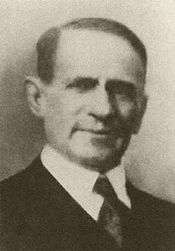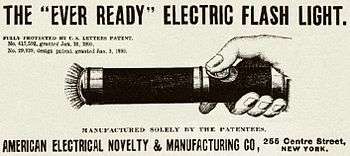Conrad Hubert
Conrad Hubert (15 April 1856 – 14 March 1928) was a Russian-American inventor[2] known for electric flashlights. He was the son of Belarusian Jewish parents who were distillers and wine producers as were their ancestors.[1]
Conrad Hubert | |
|---|---|
 | |
| Born | Akiba Horowitz[1] 15 April 1856[1] |
| Died | 14 March 1928 (aged 71)[2] |
| Nationality | Russian/American |
| Occupation | inventor |
| Known for | flashlight |
| Home town | Minsk |
Early life
Hubert attended Hebrew school when he was a boy. In 1868, at the age of thirteen, Hubert went to Berlin to study liquor distillation. While at this vocational school for 6 years he worked at odd jobs for subsistence. In 1874 he returned to Minsk and became a partner in his father's business. In the next 15 years they branched out to various cities throughout Russia. Hubert had built up a reputation as an excellent businessman.[1]
Because of the Russian persecution of Jews however, Hubert at the age of 35 decided to move to the United States in 1890.[2] He liquidated all of his commercial property and turned it into cash. The cash, however, was barely enough to buy passage to the United States. He arrived at Ellis Island in 1891 and, like many other immigrants, without knowing anybody. One of the first things he did then was change his birth name from Akiba Horowitz to Conrad Hubert.[1]
Mid life
The opportunity was not there for Hubert to start again in the distillery business, where in Russia he was well known, so he decided to start a cigar store in New York City. For the next 6 to 8 years he tried other businesses which included a restaurant, a boarding house, a jewelry store, a farm, a milk wagon route and a novelty shop. The novelty shop, American Electrical Novelty and Manufacturing Company,[3] is his legacy.[1] He ultimately turned this into the Ever Ready Company famous for its batteries.[1]
Inventions

Hubert got interested in an electrical device for lighting natural gas equipment in the later part of the 1890s.[1] He obtained this patent (No. 617,592) from David Misell, which came with an "electric device" that resembles the flashlight.
Later life and death
Hubert continued to make improvements on his "portable electric lights" from 1903 forward.[2] In 1905, he and W.H. Lawrence, who had manufactured the first consumer battery to power home telephones, formed the Ever Ready battery company.[4] He soon became a millionaire. In 1914 he sold Ever Ready Company to the National Carbon Company.[2] He soon thereafter bought a controlling share in the Yale Electric Corporation, manufacturing batteries for automobiles and later for radios, and was the chairman of the board of directors until his death.[2] He was a director of Pyrene Manufacturing Company and of Fordbrad Realty and was a member of the Chamber of Commerce of New York City and of Brooklyn. In addition to his house at 44 East 60th Street, New York, he had a winter house at Lake Wales, Florida. He was survived by two brothers and a sister. According to his will three-quarters of his entire estate (about $8,000,000) was to be sent to the Conrad Hubert Fund jointly by a Protestant, a Catholic, and a Jew to unnamed organizations that served the general public welfare. Calvin Coolidge, Alfred E. Smith and Julius Rosenwald decided on the distribution of Hubert's wealth.[1]
Sources
- Dictionary of American Biography. American Council of Learned Societies, 1928-1936. "Conrad Hubert"
- Who Was Who in America. Historical Volume, 1607-1896. Chicago: Marquis Who's Who, 1967. pg. 678
- "American Electrical Novelty and Manufacturing Company" The Journal of Electricity, Power and Gas - West, Volume 16, page 102, 1906
- History of the Energizer Battery